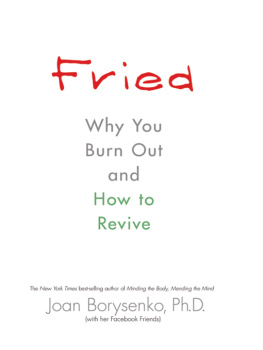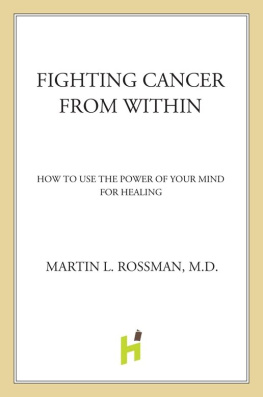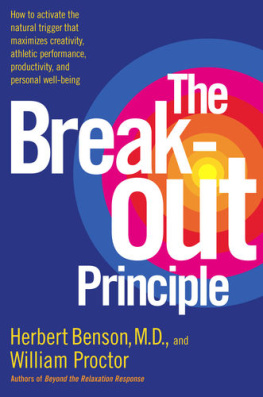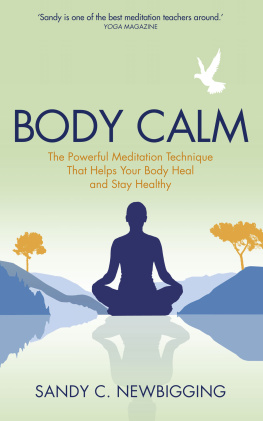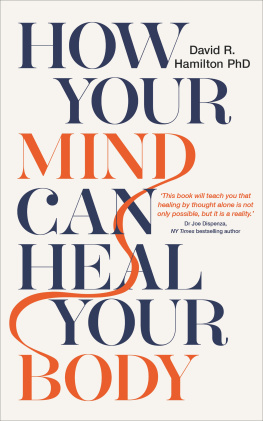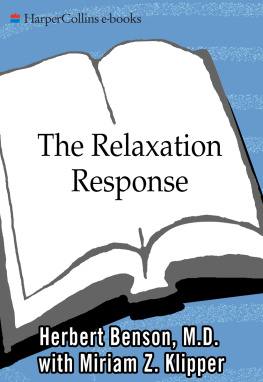Table of Contents
To Miroslav Borysenko
Once husband, always friend
FOREWORD
When I first met Dr. Borysenko in the late 1970s, she was a young cancer researcher on the faculty of the Tufts University School of Medicine in Boston, teaching both histology (microscopic anatomy) and an unusual elective course in what was then called holistic medicine. On her lunch breaks she taught hatha yoga and meditation, sometimes inviting students and colleagues back to her laboratory to sample healthful vegetarian fare afterward. Those impromptu samplings often included organic produce from her garden and wild foods foraged from the fields and forests surrounding the rural Massachusetts home where she lived. Among those foods were mushrooms shed collected as a passionate amateur mycologist.
Joans personal interest in health and natural living, coupled with her academic expertise in medical science, placed her at the leading edge of the field that later evolved into integrative medicine, which is my passion. In the twenty years that have passed since she wrote Minding the Body, Mending the Mind it has taken its place as an enduring classic. The book found its way into college and medical school classrooms, doctors offices, and hundreds of thousands of households. Joan outlines a simple, yet comprehensive and effective, approach to mental and physical well-being that has stood the test of time and the trials of modern research.
Diet and exercise are now universally recognized as critical factors affecting health and well-being. Healing practices originating in the Eastfrom hatha yoga to acupuncture and chi gongare now used as adjuncts to Western medicine. We have much evidence that meditation reduces stress and enhances immunity; now sophisticated neuroimaging studies show that it also stimulates areas of the brain that regulate happiness. And although pharmaceutical drugs have their place in the treatment of severe conditions, natural remedies, stress reduction, and lifestyle change can often achieve results that are equal to or better than prescription medications with far less risk and expense in the management of common ailments.
Whether youre a young person who hopes to live a healthy, vital, and happy life; an older person who is trying to age well and maintain your energy level and physical function; a stressed-out person yearning for balance; or someone with an acute or chronic illness that youd like to address on all levelsbody, mind, and spiritthis book can help you. Its practical, easy to understand, and based on solid research that you can trust. Furthermore, Minding the Body, Mending the Mind is an inspiring exploration of what it means to be fully humanpresent in each moment with an open mind and an open heart. In the last analysis, that may be one of the best definitions of well-being and what it means to live your best life.
Andrew Weil, M.D.
Tucson, Arizona
May 2007
ACKNOWLEDGMENTS
Much of the wisdom in this book is a gift from more than two thousand patients who participated in the Mind/Body Clinic that I directed at the Beth Israel Hospital in Boston, Massachusetts (now part of the Beth Israel/Deaconess Medical Center), from 1981 to 1987. I thank each and every one of them, for they wereand continue to bemy teachers.
The process of writing (and revising) this book stimulated recollections of my ongoing evolution from worrier to warriora quip that I attribute to my colleague Ilan Kutz, M.D., who helped found the Mind/Body Clinic with Herbert Benson, M.D., and me in September 1981. Without their outstanding vision and expertise neither the clinical programs nor this book would have existed.
I first worked with Dr. Benson as a graduate student in the Department of Pharmacology at the Harvard Medical School in the late 1960s, and again from 1978 to 1988, when he was the chief of the Division of Behavioral Medicine, first at Bostons Beth Israel Hospital, and then at the New England Deaconess Hospital. It was my good fortune to be one of the first postdoctoral fellows on the National Institutes of Health grant that he was awarded in 1978 to train health professionals in the newly emerging field of behavioral medicine. From there, under his tutelage, I became an instructor in medicine at the Harvard Medical School and was given the opportunity to cofound the Mind/Body Clinic and to participate in the divisions research efforts. I remain most grateful for these remarkable opportunities, which helped to shape my life.
I owe a very special thanks to Jon Kabat-Zinn, Ph.D., whose Stress Reduction and Relaxation Program at the University of Massachusetts Medical School was an early model for the Mind/Body Clinical Programs. His help was invaluable to us. Dr. Kabat-Zinns deep understanding of mindfulness enriched me personally as well as informed both the clinical programs and this book. His leadership in mindfulness-based stress reduction has revolutionized the field of behavioral medicine in the ensuing decades, and his friendship has been a blessing.
Stephen Maurer, M.A., dropped by the Beth Israel Hospital for lunch in October 1983 and stayed on as a source of nourishment for us all, becoming the assistant director of the Mind/Body Clinic during my tenure, and then its director for a period in the late 1980s after Id moved on. His understanding of meditation and the mind added substantial depth both to the programs and to this book, as did his wit and warmth. The chapter on mind traps is adapted from a system that Steve first introduced to us, and many of the stories about meditation are also Steves gifts. Without his bright mind and good heart, both the clinic and this book would have been far less successful than they have been.
Jane Leserman, Ph.D., a dear friend and colleague through the years, did wonderful work in the 1980s evaluating the clinical programs and developing self-assessment tools, including the medical and psychological symptoms checklists at the back of the book. Her guidance and collaboration are very much appreciated, and they helped make the research on our clinical programs possible. Steven Locke, M.D., shared his interest and enthusiasm in psychiatry and psychoneuroimmunology frequently back in the day. I thank him for his friendship, for his support, and for many stimulating conversations.
Although I am responsible for writing this bookand for the personal viewpoints expressedthe ideas on which it is based are neither new nor entirely my own. They represent the synthesis of a collective wisdom that is as old as humanity itself. Many friends and colleagues shared their work and ideas with me through the years, and their wisdom has found its way also onto these pages. Sincere thanks to Olivia Hoblitzelle, M.A.; Eileen Stuart, R.N., M.S.; Margaret Caudill, M.D., Ph.D.; Rachel Naomi Remen, M.D.; Michael Lerner, Ph.D.; Dean Ornish, M.D.; Leo Stolbach, M.D.; Matthew Budd, M.D.; David Eisenberg, M.D.; Robin Casarjian, M.A.; Bernie Siegel, M.D.; and Kenneth Pelletier, Ph.D.
Special thanks to my agent, Helen Rees, who was a champion of this book at a time when mind/body medicine was in its infancy. And without Bill Patrickmy amazing editor at Addison Wesleythis would have been a very different animal altogether. His roll up the sleeves and teach Joan how to write enthusiam, together with the collaboration of two talented writersLarry Rothstein and Ken Rivardmade this book much clearer and more accessible than it might have been if I, as a new writer, had been left to my own devices.
It seems delightful, and just a wee bit odd, to thank my family now for who they were when this book was written. We have all grown and changed in twenty years, of course, but their essence is still embedded in these pages. My former husband, Miroslav Borysenko, was a cherished colleaguea scientist in his own right and a partner in researchduring the time that I directed the Mind/Body Clinic and wrote this book. Although we are now divorced, we remain good friends. Our children, who were teens when they graciously allowed me to tell some of their stories in these pages, are now married and the parents of Alex, Eddie, and Sophiaour grandchildren. Life goes on, and my hope is that it will go on a little bit more smoothly for you because of the gifts Ive received from so many othersonly a few of whom Ive had the privilege to mention here. You can honor their gifts by passing them on to your own family and friends. That is howtogetherwe heal not only ourselves, but our world.


